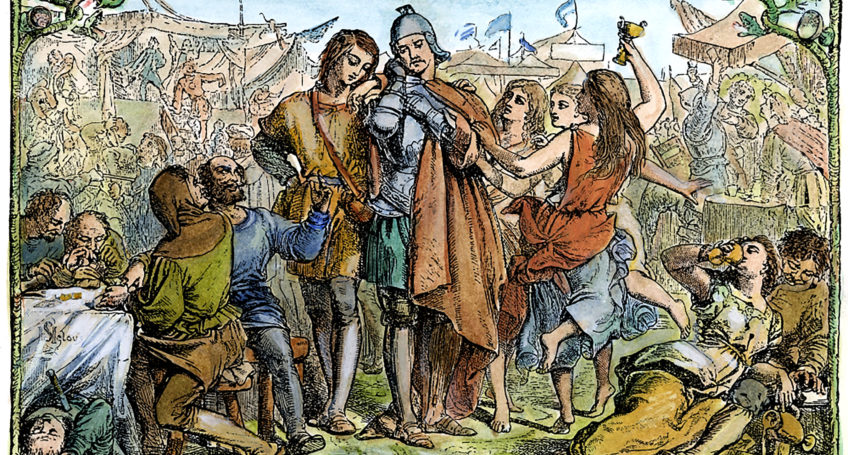We cannot understand our times, or know what we should do in them, unless we see our times in the larger framework of history. There is a framework of history, and Christians can know it. Jesus reveals it to us in the parable of the wheat and the tares, and this is the subject of our study. Click here to read the whole study and/or download this resource.
The Voyage of Life: Part 3 Hope After Death by Ken Boa at Reflections Ministries Click here to read by words of appreciation for Ken Boa and this series. A Definition
A Kingdom Disciple is, quite simply, a follower of the Lord Jesus Christ. The phrase, Kingdom Discipleship, is my shorthand way of communicating what it means to live faithfully as his follower, under his Lordship, and in his Kingdom. This distinctive is not really mine. It’s neither innovative nor original. However, my goal in emphasizing Kingdom Discipleship is to help Christians understand more fully what God has revealed in and through his Word. It is also my desire to stand squarely in the tradition of our Christian heritage, most especially my own particular lineage of John Wesley. Jesus Christ is Lord By using the phrase, Kingdom Discipleship, I wish to remind disciples of Jesus Christ that our call is to faithfully and obediently follow Christ in every sphere of life. I believe this is imperative because Jesus Christ is Lord over every sphere of life. It was God who granted Jesus authority over all heaven and earth (Matt. 28:18) and gave him the name above every name (Phil. 2:9). It would, therefore, run counter to the biblical witness regarding our Lord’s authority, for his followers to live compartmentalized lives. God doesn’t want us to submit to Christ for just 70 or even 95 percent of our lives. He wants all of us. To paraphrase Abraham Kuyper, there is not a square inch in all the universe Christ has not claimed for himself. Every Sphere Therefore, our call as his followers is to intentionally, faithfully, obediently, and joyfully extend his Kingdom – his rule, reign, will, and influence – into every sphere of our lives (in every area of responsibility, interest, relationship, and authority). Everything, what some might call the common and the uncommon, the sacred and the secular, is to be lived for God’s glory (1 Corinthians 10:31) and according to his will. God’s Kingly Influence The influence of the Kingdom of God and of his Christ must come through gracious, loving, and truthful persuasion, modeling, and witness, never through coercion or manipulation. The kind of transformed individual, family, church, state, society, and world God desires will not, indeed, must not come through violent political revolution or rebellion but by the regenerating power of the Holy Spirit and the subsequent “salt and light influence” of God’s people. The Local Church The primary means, humanly speaking, by which God’s Kingdom is extended in this way is through local assemblies of God’s people. It is in and through the local church that the life-giving, mind-renewing, and life-transforming Gospel of the Kingdom is proclaimed, taught, and lived out. It is only as men, women, boys, and girls are reborn by the Spirit of God that they are able to enter the Kingdom of God (John 3:3-8). Then, as they continue to grow in their faith, having their minds renewed and lives transformed, they become better educated, equipped, and encouraged to take this good news of the Kingdom into every sphere of their lives. And just as the woman in Jesus’ parable mixes her yeast into the dough and works it until it permeates all of it (Luke 13:20-21), so too is the Kingdom of God extended into every sphere of life by his disciples. Understanding the Times: Part 3 The Religion of Secularism by T.M. Moore at The Fellowship of Ailbe The Fellowship of Ailbe is a spiritual fellowship in the Celtic tradition. At the Fellowship of Ailbe website, you can find many helpful resources to grow deeper and wider in your faith in Christ. This post contains Part 2, in a series by T.M. Moore on Understanding the Times. Here's T.M.'s introduction to Part 3... Our friends and neighbors who have chosen to live under the sun rather than under the heavens congratulate themselves for having outgrown what they consider the childish and futile practices of religion. Click here to read the whole study and/or download this resource.
Character Then Influence
In his commentary on the Sermon on the Mount, John Stott reminds his readers that if Matthew 5:3-12 (the Beatitudes) is about a Christian’s character, then Matthew 5:13-16 is about a Christian’s influence in this world. I have always loved the words of Matthew 5:13-16, which describe Christian influence as salt and light. These words of Jesus point us toward the right balance of inward piety and outward action. It’s important to note, Jesus doesn’t tell us to go out and be salt and light. He declares we already are salt and light. As those who have experienced new birth, we are now new creatures in Christ whose character is increasingly reflected in the Beatitudes. To paraphrase the Apostle Peter, we are holy so we should go and be holy. We are to “go be who we already are,” Jesus and Peter teach us. Two Cautions I love this text because it strikes an important connection and balance between inward piety and outward action. The inward and private pursuit of the devotional life, of spiritual introspection and reflection is vital, but if it never moves one forward to “live” the life of Christ in the world then it can become an empty and useless form of asceticism. A person can become quickly self-absorbed in their own stuff if their piety never leaves the prayer closet or Bible study. I hasten to add that, in my opinion, this is not the greatest threat to the church today. Would that more people spent greater time in the prayer closet and Bible study. That leads me to the other side of the coin. As important as outward action (good works) is, if godly character is not undergirding and directing it, then it can become nothing more than the cause de jour. And that can morph into a self-centered, legalistic way for a person to build himself or herself up, and become a judgmental, finger-wagging Pharisee. Not only that, without the knowledge of Christ and the godly character that comes from that relationship, such action can quickly lead to burnout and disillusionment because, to paraphrase Jesus in John 15, the branch was attempting to do all the work without being connected to the vine. Thus, the branch lacked sustenance, power, and direction. The Role of the Church To live as salt and light means disciples of Jesus Christ must exercise the godly influence of the Kingdom of God in the midst of the decay and darkness of the Kingdom of this world. A ministry of discipleship should include educating, equipping, and encouraging followers of Jesus Christ to take up their call to extend their Kingdom into every sphere of their lives as salt and light. It's a both/and proposition: local churches should teach disciples how to build up their own faith and character so they can faithfully live as salt and light. So too should they equip and encourage their members to live out that faithfulness at home with their families, among friends, in the schools, at work, church, in their neighborhoods, communities, city or town, or even in the broader culture or world. A discipleship ministry should focus on both inward piety and outward action. This is how the church can faithfully minister as salt and light in today’s world. Foundations of Christian Doctrine: Part 1 Why Study Doctrine? by William Lane Craig at Reasonable Faith The Voyage of Life: Part 2 Victory Over Death by Ken Boa at Reflections Ministries Click here to read by words of appreciation for Ken Boa and this series. Understanding the Times: Part 2 Vanity Fare by T.M. Moore at The Fellowship of Ailbe The Fellowship of Ailbe is a spiritual fellowship in the Celtic tradition. At the Fellowship of Ailbe website, you can find many helpful resources to grow deeper and wider in your faith in Christ. This post contains Part 2, in a series by T.M. Moore on Understanding the Times. Here's T.M.'s introduction to Part 2... Christians have been sent to the world as Jesus was sent, to embody and announce the coming of God’s Kingdom on earth, as it is in heaven (Jn. 20.21; Acts 1.8). Click here to read the whole study and/or download this resource.
All Scripture is breathed out by God and profitable for teaching, for reproof, for correction, and for training in righteousness, that the man of God may be competent, equipped for every good work. (2 Timothy 3:16-17) Our True Rule
The United Methodist Church, by way of its denominational standard, addresses the sufficiency of Scripture. The 2008 Book of Discipline reminds us, Scripture is “necessary for salvation” and is “the true rule and guide for faith and practice.” The "practice" referenced is the practice of our faith, the exercise of living this life under the Lordship of Jesus Christ and preparing for the next. We believe God expects us to live such a life in accordance with Scripture’s direction, rules, laws, commands, examples, teachings, principles, and all the rest. That covers a great deal of ground. Scriptural Holiness United Methodists believe that what John Wesley called scriptural holiness relates to both our inward walk with Christ and the outward expression of that relationship with our neighbors. Our Doctrinal Statements, General Rules, and Social Principles cover an enormous variety of topics, such as God, the Church, the Bible, discipleship, economics, environment, bioethics, justice, marriage, parenting, politics, poverty, and yes, our precious Lord Jesus Christ and the salvation that comes through him. In all these spheres and more, Scripture is our “true rule and guide for faith and practice.” The 2008 Discipline says this about scriptural holiness, We insist that personal salvation always involves Christian mission and service to the world. By joining heart and hand, we assert that personal religion, evangelical witness, and Christian social action are reciprocal and mutually reinforcing. Scriptural holiness entails more than personal piety; love of God is always linked with love of neighbor, a passion for justice and renewal in the life of the world. Every Sphere In other words, Scripture is sufficient for every sphere of life. This is what our Discipline means when it reminds us that Scripture is “necessary for salvation” and is “the true rule and guide for faith and practice.” So, while the Bible doesn’t, for example, teach me how to change the oil in my car, it still directs and guides me to do even something as mundane (and as important) as that to God’s glory. It teaches me to be a good steward of what God has provided. And caring for my car in such a manner shows my love for my closest neighbors - my family. The Apostle Paul teaches us, All Scripture is breathed out by God and profitable for teaching, for reproof, for correction, and for training in righteousness, that the man of God may be competent, equipped for every good work. (2 Timothy 3:16-17) Scripture is profitable for every area of your life. He doesn’t use the same language here, but Paul is saying Scripture is sufficient for every sphere of life. Bishop Mack Stokes addressed this by writing, Immediately following the “General Rules,” Wesley wrote, ‘These are the General Rules of our society; all which are taught of God to observe, even in his written Word, which is the only rule, and the sufficient rule, both of our faith and practice.’ (The Bible in the Wesleyan Heritage, p. 21) Understanding that Scripture is sufficient for faith and practice is not the same as saying the Bible is a science textbook, a political constitution, or a manual for how to care for your car. But the Bible clearly does have something (and something important) to say about those areas of life and far more. Wayne Grudem, (who is not a United Methodist), shares this definition for the sufficiency of Scripture, which I believe is helpful. He writes, The sufficiency of Scripture means that Scripture contained all the words of God he intended his people to have at each stage of redemptive history, and that it now contains all the words of God we need for salvation, for trusting him perfectly, and for obeying him perfectly. (Systematic Theology, p. 127) God commands us to submit to our Lord in every sphere of life and he guides us in that quest in and through his Word. It is sufficient for such a grand pursuit. Walking Points
|
Every SphereLong and short takes on various spheres of life from a Christian worldview Categories
All
Archives |






 RSS Feed
RSS Feed
